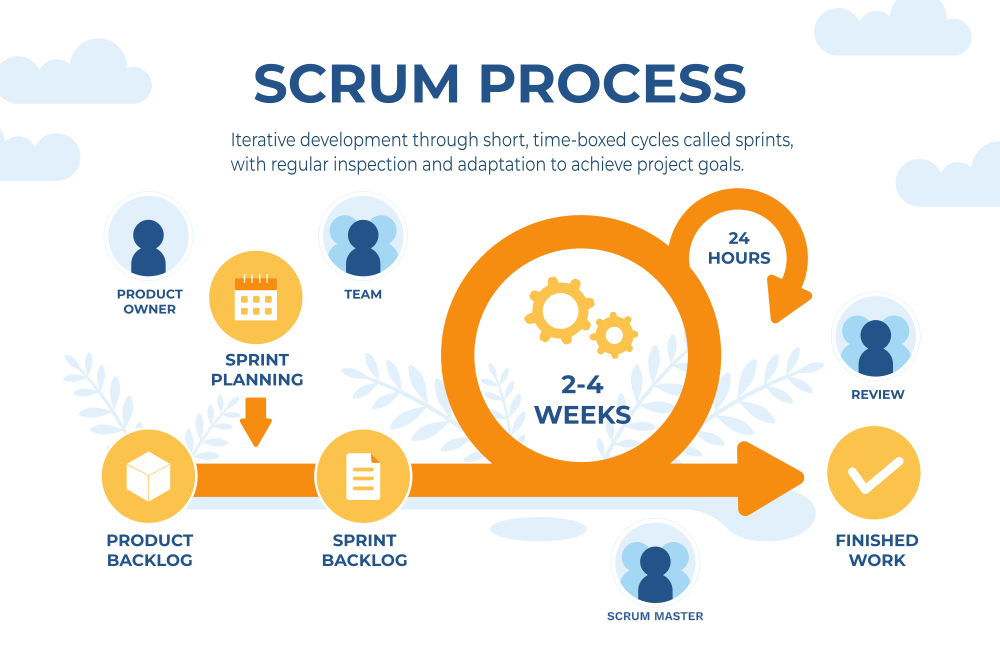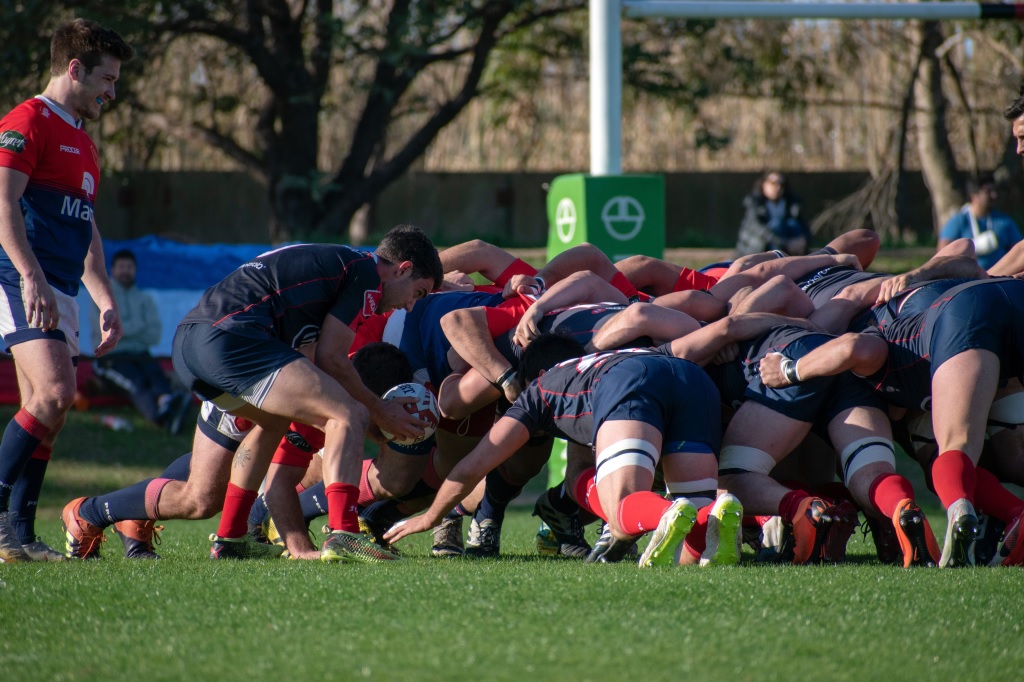Introduction to Scrum and the Scrum Master role
What is Scrum?
Scrum, a framework for agile project management and product development, was introduced in the early 1990s. It was first described by Jeff Sutherland and Ken Schwaber in a paper presented at the OOPSLA (Object-Oriented Programming, Systems, Languages & Applications) conference in 1995.
The term “Scrum” was inspired by a phase in the Rugby where two opposing teams come in a tightly bound formation and move together to push the ball forward. It’s derived from the word “scrimmage,” which originally referred to a disorderly fight.

Scrum was developed as an iterative approach for software development teams to handle complex and unpredictable tasks. Since then, it has evolved into a larger framework used to manage any kind of work or project.
At its core, Scrum is based on three pillars – transparency, inspection, and adaptation – which form the foundation for successful agile product development.
Since its introduction, Scrum has gained popularity as a flexible and effective approach for managing complex projects, not only in the software development industry. The Scrum Guide, has been periodically updated to reflect the current best practices in Scrum.
How Scrum Works?
Scrum is based on short iterations called Sprints, and emphasizes inspection and adaptation, allowing teams to improve continuously the product and the development process:
- The Product Owner creates a Product Backlog, which is a prioritized list of features, enhancements, and fixes that represent the work to be done on the project.
- The Development Team then plans items from the Product Backlog to be worked on during the upcoming Sprint, an iteration of 1-4 weeks.
- Each day during the Sprint, the Development Team holds a Daily Standup meeting discuss what they did yesterday, what they plan to do today, and any obstacles or impediments they are facing.
- At the end of the Sprint, the Scrum Team the team demonstrates the work they completed and gather feedback from stakeholders in a Sprint Review. The team reflects in a Sprint Retrospectives what went well and what could be improved for the next Sprint.
The Role of the Scrum Master
The Scrum Master is responsible for facilitating the scrum process by developing and maintaining a productive environment where the team can focus on completing their tasks effectively.
A Scrum Master must possess strong interpersonal and problem-solving skills to ensure that any problems are addressed quickly and efficiently. Moreover, he has an in-depth understanding of agile practices to help the team improve their processes.
Responsibilities and tasks of a Scrum Master
Master of the Scrum Process
The primary responsibility of a Scrum Master is to facilitate the Scrum Process and Rituals. As a method expert, the Scrum Master instructs the team about the Scrum Framework and organizes these meetings to ensure that they are effective. He will support the team in adapting the process to its context and continuously improve it.
Meeting Facilitator
Bad meetings have a significant impact on the team’s productivity; therefore, the Scrum Master generally acts as meeting facilitator to ensure that the objectives of meetings are fulfilled. A Scrum Master is an expert in using facilitation techniques to keep the attention in meetings high and foster collaboration between team members.
A Scrum Master must not have technical knowledge; however, it is useful to understand what the team is discussing and be able to moderate the discussion, in case the teams lose sight of the objectives of a meeting.
Master of team rules
As master of processes, the Scrum Master ensures that rules defined by the team for their teamwork are applied. He is like a Referee, observing what the team is doing and warning the team about rule violations.
As part of the continuous improvement process, he will facilitate the adaptation or removal of these rules when needed.
Coach of team members
Scrum Masters serve as mentors who provide guidance while allowing every team member to contribute their strengths to reach the team objectives. He is helping team members to develop soft skills for optimal collaboration in the team. He will help the team solve divergent opinions and conflicts that naturally happen in every team.
Impediment remover
As issues arise during development cycles or external factors cause delays, it’s up to the Scrum Masters to quickly recognize these obstacles and remove them so that progress can continue without interruptions. Therefore, he must be available at any time to provide support and solve urgent issues.
When needed, he may act as a proxy between the team and the external stakeholders to protect the teams from being interrupted during their work.
Coach of the Product Owner
The Product Owner is responsible for defining the Product Roadmap, setting timelines, and acting as the voice of the customer. As the Product Owner has a key role in the success of Scrum, the Scrum Master is working closely with the Product owner to help him prioritize the backlog and ensure the quality of deliverables.
Benefits of having a Scrum Master
Better decisions
Scrum Masters help teams become self-organizing. They encourage teams to make decisions collectively, which fosters a sense of ownership and responsibility. By applying the right decision framework, the team can make better decisions and which have a higher probability to be implemented.
Better Productivity
Context switching is one of the most important is one of the main obstacles to productivity. By helping the team reduce the number of parallel tasks in progress, the team has better alignment and focus.
By monitoring productivity, and continuously inspecting and adapting their process, the team can make the right decisions to improve their created business value.
As the Scrum Master is responsible for facilitating the Sprint Retrospectives, the team can learn more quickly from its mistakes and take actions to improve their teamwork.
Reduced risks
With their focus on transparency and early issue detection, Scrum Masters help reduce project risks by addressing problems promptly and effectively.
As feel-good manager, the Scrum Master ensures that the satisfaction of team members remains high. He detects and solves conflicts quickly, reducing the risk of turn-over in the team.
By ensuring that the team has the right skills and fostering knowledge transfer, for instance with a skill matrix tool, the risk of productivity breakdown when a team member is leaving is reduced.
Better quality
By emphasizing continuous improvement and adherence to the Definition of Done, Scrum Masters contribute to the delivery of higher-quality products. He
Scrum Masters may help the team establish and monitor quality-related metrics, such as defect rates, code coverage, and customer satisfaction. Monitoring these metrics can provide early warning signs of quality issues and guide process improvements.
Scrum Masters work with the team to address technical debt, which refers to suboptimal or incomplete implementation or design that can accumulate over time. Managing technical debt is crucial for maintaining product quality, as it ensures that the product remains clean and maintainable.
Is the Scrum Master a full-time job?
The Scrum Framework defines the Scrum Master has a role that can be taken by a person of the team. Whether is a full-time job for a dedicated person has to be decided depending on the context.
In the early stages of a team, the Scrum Master is very busy with on-boarding, conflict resolution, and defining with team processes. I have experienced that supporting a team during the first months justifies a full-time dedication.
The Return on Investment of a Scrum Master is obvious: assuming that a scrum master supports 7 team members, and has the same salary as them, he is already paid off when the team is (1/7 = 15%) more productive.
Let’s take a look at obvious productivity gains:
- Helps to better prioritize its backlog and describe the user stories: 5-20% time saved
- Makes meetings more efficient: 10-50% time saved
- Solve conflicts and makes people more happy at work: 5-20% more productivity
- Fosters knowledge transfer and skill development: 5-10% more productivity
- Remove impediments faster: 0-10% more productivity
Evolution of the Scrum Master role
The Scrum Master serves as a facilitator, mediator, coach, trainer, problem solver, mentor, consultant, enabler, listener, happiness manager – whatever role is required at any given moment. In summary, a Scrum Master is a critical role in the Scrum framework, and their presence brings numerous benefits to the team and the organization. They act as coaches, facilitators, and champions of Agile principles, helping teams deliver more value.
Scrum has been during the last 20 years the dominating agile framework. Many people experienced the limits of the Sprint approach in a highly volatile environment. I have taken some distances with the framework and moved back to the root of Agility by using a continuous flow of work management with KANBAN. Scrum Masters will probably evolve to Agile Masters in their organization, being less tied to a particular framework and taking more responsibility for the people’s development.

